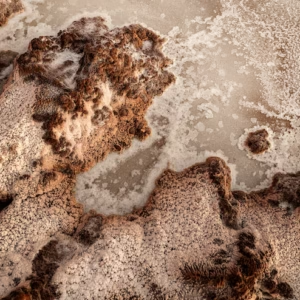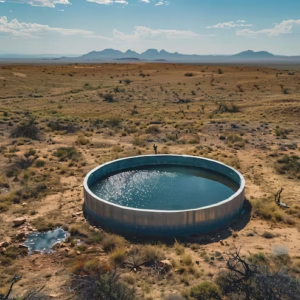Introduction to Bentonite and Its Importance in Paint
Bentonite, a naturally occurring clay primarily composed of montmorillonite, is a versatile mineral renowned for its unique properties like high absorbency, swelling capacity, and thixotropic behavior. At CMS Industries, India’s leading bentonite manufacturer and exporter, we harness these properties to deliver high-quality bentonite tailored for various industries, including paint and coatings. This blog explores the production process of bentonite, its critical role in paint manufacturing, and why CMS Industries is your trusted partner for premium bentonite solutions.
With global paint and coatings demand projected to reach $250 billion by 2027, bentonite’s role as a functional additive is more vital than ever. Its ability to enhance paint performance, improve texture, and ensure durability makes it indispensable. Let’s dive into how bentonite is made and its transformative applications in the paint industry.
What is Bentonite?
Bentonite is a clay mineral formed from volcanic ash weathering in marine environments. Named after Fort Benton, Wyoming, where it was first discovered, bentonite is classified into two primary types: sodium bentonite and calcium bentonite. Sodium bentonite, with its high swelling capacity, is ideal for industrial applications like paint, while calcium bentonite is often used in personal care and agriculture.
At CMS Industries, we source bentonite from our extensive mines in Gujarat, India, ensuring exceptional purity and consistency. Our bentonite’s unique chemical composition, rich in silica, aluminum, and trace minerals, makes it a perfect fit for paint formulations.
The Making of Bentonite: From Mine to Market
Producing high-quality bentonite is a meticulous process that combines advanced technology with sustainable practices. CMS Industries follows a streamlined production process to deliver bentonite powder and granules optimized for paint applications. Here’s how we do it:
1.Mining Bentonite
Bentonite is extracted through open-pit mining in our strategically located mines in Mandvi Taluka, Gujarat, near the ports of Mundra and Kandla. Drilling and blasting techniques are used to access high-grade bentonite deposits. Each batch undergoes rigorous quality testing to ensure it meets industry standards.
2.Crushing and Cleaning
Raw bentonite lumps are transported to our state-of-the-art processing facilities, where they are crushed into smaller particles. Impurities like rocks and organic matter are removed through washing and screening, ensuring a pure base material.
3.Drying
The crushed bentonite is dried using rotary kiln or fluidized bed dryers to remove excess moisture. Controlled drying preserves the clay’s natural properties, making it suitable for paint applications where moisture content is critical.
4.Milling and Grinding
Dried bentonite is milled into fine powder or granules, depending on the application. For paint, we produce micronized bentonite powder with particle sizes as small as 10-40 microns, ensuring smooth dispersion in paint formulations.
5.Activation (If Required)
For specific paint applications, bentonite may undergo chemical activation to enhance its swelling or absorption properties. Sodium activation, where calcium bentonite is treated with sodium carbonate, is common for producing high-performance sodium bentonite.
6.Quality Control and Packaging
Every batch is tested for parameters like swelling capacity, viscosity, and pH to ensure consistency. The final product is packaged in moisture-resistant bags, ready for domestic and international markets.
CMS Industries produces over 9,000 metric tons of bentonite powder monthly, adhering to ISO 9001:2015 standards. Our eco-friendly mining and processing practices minimize environmental impact, aligning with global sustainability goals.
Why Bentonite is Essential in Paint Manufacturing
Bentonite’s unique properties make it a game-changer in the paint and coatings industry. It acts as a rheology modifier, thickener, and stabilizer, enhancing paint performance and application. Here’s why bentonite is indispensable:
1.Rheology Control
Bentonite imparts thixotropic properties, allowing paint to flow smoothly during application but resist sagging once applied. This ensures even coverage on vertical surfaces and reduces drips, improving aesthetic appeal.
2.Suspension of Pigments
Bentonite prevents pigment settling by forming a gel-like structure in paint formulations. This ensures consistent color distribution and eliminates the need for frequent stirring, enhancing user convenience.
3.Improved Film Formation
Bentonite enhances paint adhesion to surfaces, creating a durable, uniform film. This is critical for both decorative and industrial coatings, where longevity and weather resistance are paramount.
4.Cost-Effectiveness
As a natural, abundant mineral, bentonite is a cost-effective alternative to synthetic thickeners. It reduces formulation costs without compromising quality, making it ideal for large-scale paint production.
5.Environmental Benefits
Bentonite is non-toxic and eco-friendly, aligning with the growing demand for sustainable paint formulations. CMS Industries’ bentonite is free from harmful chemicals, ensuring safe use in water-based and solvent-based paints.
Applications of Bentonite in Paint
Bentonite’s versatility allows it to be used in various paint types, from architectural to industrial coatings. Here are its key applications:
1.Water-Based Paints
In water-based paints, sodium bentonite acts as a thickener and stabilizer, improving viscosity and preventing pigment sedimentation. It’s ideal for eco-friendly paints, which dominate the market due to low VOC emissions.
2.Solvent-Based Paints
Bentonite enhances the stability of solvent-based paints, ensuring smooth application and resistance to environmental factors like humidity and UV exposure. It’s widely used in industrial coatings for machinery and infrastructure.
3.Primers and Undercoats
Bentonite improves the adhesion and coverage of primers, creating a strong base for topcoats. Its ability to fill surface imperfections ensures a smooth, professional finish.
4.Textured Paints
For textured or specialty paints, bentonite provides the necessary body and structure, enabling unique finishes like stucco or sand effects. It ensures the paint retains its texture during application and drying.
5.Anti-Corrosion Coatings
In marine and industrial settings, bentonite-enhanced coatings protect metal surfaces from corrosion by forming a water-resistant barrier. Its swelling properties seal micro-cracks, extending coating lifespan.
CMS Industries’ DOLCHEM Bentonite BNT304, specifically designed for industrial paints, offers superior thixotropy and pigment suspension, making it a top choice for paint manufacturers worldwide.
Benefits of Choosing CMS Industries for Bentonite in Paint
As India’s largest bentonite mine owner, processor, and exporter, CMS Industries stands out for its commitment to quality, innovation, and sustainability. Here’s why paint manufacturers trust us:
1.Unmatched Quality
Our bentonite undergoes stringent quality checks to ensure consistent performance. With high swelling capacity and fine particle size, our products meet the exacting demands of the paint industry.
2.Global Reach
With strategic proximity to Mundra and Kandla ports, we export bentonite to over 30 countries, ensuring timely delivery and competitive pricing. Our global supply chain supports paint manufacturers worldwide.
3.Customized Solutions
We offer tailored bentonite grades to suit specific paint formulations, from high-viscosity sodium bentonite for thick coatings to micronized powders for smooth finishes.
4.Sustainable Practices
Our eco-friendly mining and processing methods minimize environmental impact. We prioritize land reclamation and energy-efficient technologies, aligning with green manufacturing trends.
5.Technical Expertise
Our R&D team collaborates with paint manufacturers to optimize bentonite performance, providing technical support and formulation guidance to enhance product quality.
How Bentonite Enhances Paint Sustainability
Sustainability is a key driver in the paint industry, with consumers and regulators demanding eco-friendly products. Bentonite plays a pivotal role in this shift:
- Low Environmental Impact: Bentonite’s natural composition reduces reliance on synthetic additives, lowering the carbon footprint of paint production.
- Biodegradability: Unlike some chemical thickeners, bentonite is biodegradable and safe for disposal, minimizing environmental harm.
- Energy Efficiency: Bentonite’s ease of processing requires less energy compared to synthetic alternatives, supporting sustainable manufacturing.
CMS Industries leads the way in sustainable bentonite production, ensuring our products contribute to greener paint formulations without sacrificing performance.
Also Check:-Is Bentonite Clay Good for Plants?
Challenges and Solutions in Using Bentonite for Paint
While bentonite offers numerous benefits, its use in paint formulations can present challenges. Here’s how CMS Industries addresses them:
Challenge 1: Dispersion Issues
Improper dispersion can lead to clumping or uneven texture in paint. Solution: Our micronized bentonite powders are pre-treated for easy dispersion, ensuring smooth integration into paint formulations.
Challenge 2: Moisture Sensitivity
Excess moisture in bentonite can affect paint stability. Solution: Our advanced drying techniques maintain optimal moisture levels, guaranteeing consistent performance.
Challenge 3: Compatibility with Other Additives
Bentonite may interact with certain paint additives, affecting viscosity. Solution: We provide technical support to optimize formulations, ensuring compatibility with solvents, pigments, and binders.
The Future of Bentonite in the Paint Industry
The paint industry is evolving, with trends like smart coatings, low-VOC paints, and bio-based formulations gaining traction. Bentonite is poised to play a central role in these innovations:
- Smart Coatings: Bentonite’s thixotropic properties can enhance self-healing or temperature-responsive coatings, improving durability and functionality.
- Eco-Friendly Paints: As demand for sustainable paints grows, bentonite’s natural properties make it a cornerstone of green formulations.
- Nanotechnology: Nano-bentonite, with its ultra-fine particles, is being explored for advanced coatings with enhanced barrier properties.
CMS Industries is investing in R&D to develop next-generation bentonite products, ensuring we remain at the forefront of paint industry advancements.
Also Read:-What Is Food Grade Bentonite Clay
Why CMS Industries is Your Ideal Bentonite Partner
With decades of experience, CMS Industries is more than a supplier – we’re a partner in your success. Our commitment to quality, sustainability, and innovation sets us apart:
- Proven Track Record: As India’s largest bentonite exporter, we serve global paint manufacturers with unmatched reliability.
- Advanced Facilities: Our processing plants use cutting-edge technology to produce bentonite that meets international standards.
- Customer-Centric Approach: From product customization to technical support, we prioritize your needs to deliver tailored solutions.
Visit CMS Industries to explore our bentonite products and request samples for your paint formulations.
Conclusion
Bentonite is a powerhouse in the paint industry, offering unmatched versatility, performance, and sustainability. From rheology control to pigment suspension, its contributions are critical to producing high-quality paints. CMS Industries, with its expertise and commitment to excellence, is your trusted source for premium bentonite tailored for paint applications. Contact us today to discover how our bentonite can elevate your paint formulations and help you stay ahead in a competitive market.
Frequently Asked Questions (FAQs)
- What role does bentonite play in paint manufacturing?
Bentonite acts as a rheology modifier, thickener, and stabilizer in paint, ensuring smooth application, pigment suspension, and durability. CMS Industries’ bentonite enhances paint performance while supporting eco-friendly formulations.
- How is bentonite processed for paint applications?
Bentonite is mined, crushed, dried, and milled into fine powder or granules. CMS Industries uses advanced processing to ensure high purity and optimal particle size for seamless integration into paint formulations.
- Why choose CMS Industries for bentonite in paint?
CMS Industries offers high-quality, customized bentonite with global reach and sustainable practices. Our ISO 9001:2015 certification and technical expertise make us a reliable partner for paint manufacturers worldwide.
- Can bentonite be used in eco-friendly paints?
Yes, bentonite is non-toxic and biodegradable, making it ideal for low-VOC and sustainable paints. CMS Industries’ bentonite supports green formulations, reducing environmental impact without compromising quality.
- What types of bentonite are best for paint?
Sodium bentonite, with its high swelling capacity, is ideal for paint due to its thixotropic properties. CMS Industries’ DOLCHEM Bentonite BNT304 is specifically designed for industrial paint applications.







